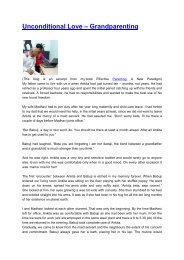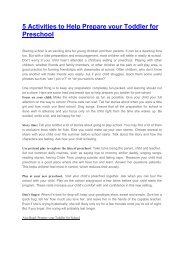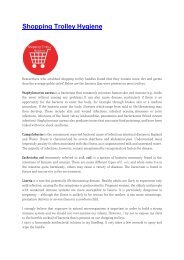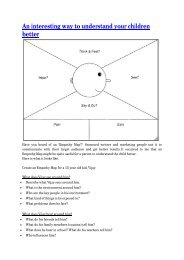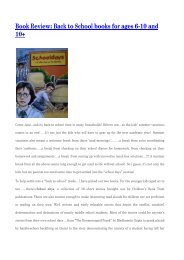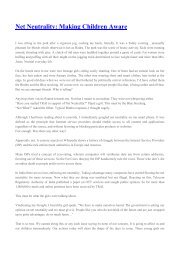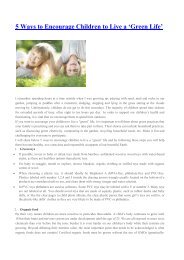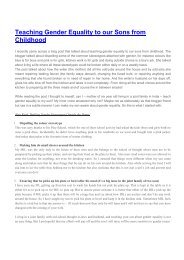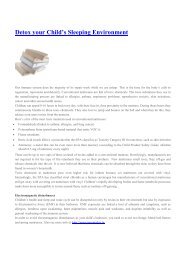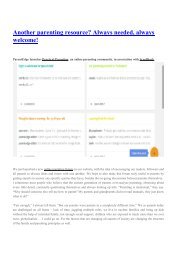A Parent’s Role in Career Choices
The Pathways Program is an education services enterprise that provides career guidance and skill development
The Pathways Program is an education services enterprise that provides career guidance and skill development
You also want an ePaper? Increase the reach of your titles
YUMPU automatically turns print PDFs into web optimized ePapers that Google loves.
The Pathways Program is an education<br />
services enterprise that provides career<br />
guidance and skill development programmes<br />
to high school and college students.<br />
More than 5000 students are enrolled<br />
<strong>in</strong> The Pathways Program across schools<br />
<strong>in</strong> Hyderabad, Chennai, Coimbatore and<br />
Bangalore. Pathways also contributes a<br />
regular bimonthly column – Road Map – to<br />
the Education Plus supplement of The H<strong>in</strong>du.<br />
Dr. Ramakrishnan believes that career<br />
guidance is not just about help<strong>in</strong>g a student<br />
choose between science and commerce or<br />
the right college. It should actually help<br />
students understand what work<strong>in</strong>g <strong>in</strong>volves,<br />
analyse their <strong>in</strong>terests and strengths, and<br />
then choose a career that is right for them.<br />
When high-schools students are decid<strong>in</strong>g<br />
which area of study to pursue at the<br />
undergraduate level, who or what<br />
<strong>in</strong>fluences this decision – peers, parents,<br />
or teachers?<br />
Parents cont<strong>in</strong>ue to be the key <strong>in</strong>fluencers<br />
of this decision. If not parents, it could<br />
be other members of the larger family like<br />
uncles/aunts or <strong>in</strong> some cases, friends of<br />
parents. Peers are next. Teachers actually<br />
play a m<strong>in</strong>imal role.<br />
What role do parents play <strong>in</strong> <strong>in</strong>fluenc<strong>in</strong>g<br />
their children’s choice of career today?<br />
Most parents have a plan <strong>in</strong> m<strong>in</strong>d for<br />
their children. The roles played could<br />
be proactive, where the parent acts as a<br />
facilitator and helps the child understand<br />
the options available, or reactive where<br />
not much time and thought is given to the<br />
decision. Ideally, parents should discuss<br />
this <strong>in</strong> depth with their children, and<br />
the specifics of the situation should be<br />
addressed. Let me expla<strong>in</strong> the two roles by<br />
talk<strong>in</strong>g about two situations and the types<br />
of <strong>in</strong>terchange that can occur:<br />
facts. On prob<strong>in</strong>g, it is clear that the son’s<br />
sudden <strong>in</strong>terest <strong>in</strong> medic<strong>in</strong>e was <strong>in</strong>fluenced<br />
by a television serial (Grey’s Anatomy).<br />
But unfortunately what is shown <strong>in</strong> these<br />
serials is not the real picture of healthcare.<br />
The father wants his son’s decision to be<br />
based on an <strong>in</strong>formed view of a career <strong>in</strong><br />
medic<strong>in</strong>e and not by the glamour of what’s<br />
shown on television. Hence, he arranges<br />
a six-week programme for his son, where<br />
the latter shadows doctors and tries to<br />
understand the ‘real world’ of medic<strong>in</strong>e. In<br />
this case, the parents are help<strong>in</strong>g the child<br />
understand specifics of the career so he can<br />
make an <strong>in</strong>formed decision.<br />
Example 2 – reactive/bad conversation:<br />
Father – Son, do eng<strong>in</strong>eer<strong>in</strong>g.<br />
Son – I am not <strong>in</strong>terested <strong>in</strong> eng<strong>in</strong>eer<strong>in</strong>g.<br />
Father – What do you want to do?<br />
Son – I don’t know ….<br />
Father – Then do eng<strong>in</strong>eer<strong>in</strong>g!<br />
In today’s world, the roles parents play<br />
have to expand and more time should<br />
be devoted to career-choice discussions.<br />
There is a press<strong>in</strong>g need to <strong>in</strong>crease ‘good<br />
conversations’!<br />
In your op<strong>in</strong>ion, to what extent should<br />
a parent <strong>in</strong>fluence a child’s choice of<br />
career?<br />
Parents have to play a major role as the<br />
role of school teachers <strong>in</strong> our country is<br />
m<strong>in</strong>imal, unlike <strong>in</strong> the west where schools<br />
have a counsellor who assists considerably<br />
<strong>in</strong> the process. S<strong>in</strong>ce this is not a<br />
straightforward decision to make, gett<strong>in</strong>g<br />
it right is important. It is the parent’s<br />
duty to present all the variables to their<br />
children, have a frank discussion about<br />
their f<strong>in</strong>ancial assets and <strong>in</strong>vestments, and<br />
explore and understand the child’s <strong>in</strong>terest<br />
and strengths. Sufficient time should be<br />
<strong>in</strong>vested <strong>in</strong> structured discussions.<br />
Example 1 – proactive/good conversation:<br />
A parent who is runn<strong>in</strong>g a flourish<strong>in</strong>g<br />
bus<strong>in</strong>ess may not immediately warm up<br />
to the idea of his son do<strong>in</strong>g medic<strong>in</strong>e.<br />
However, <strong>in</strong>stead of dissuad<strong>in</strong>g the son,<br />
the father seeks to ensure that he makes a<br />
fully <strong>in</strong>formed decision based on the right<br />
54<br />
May - June 2013





